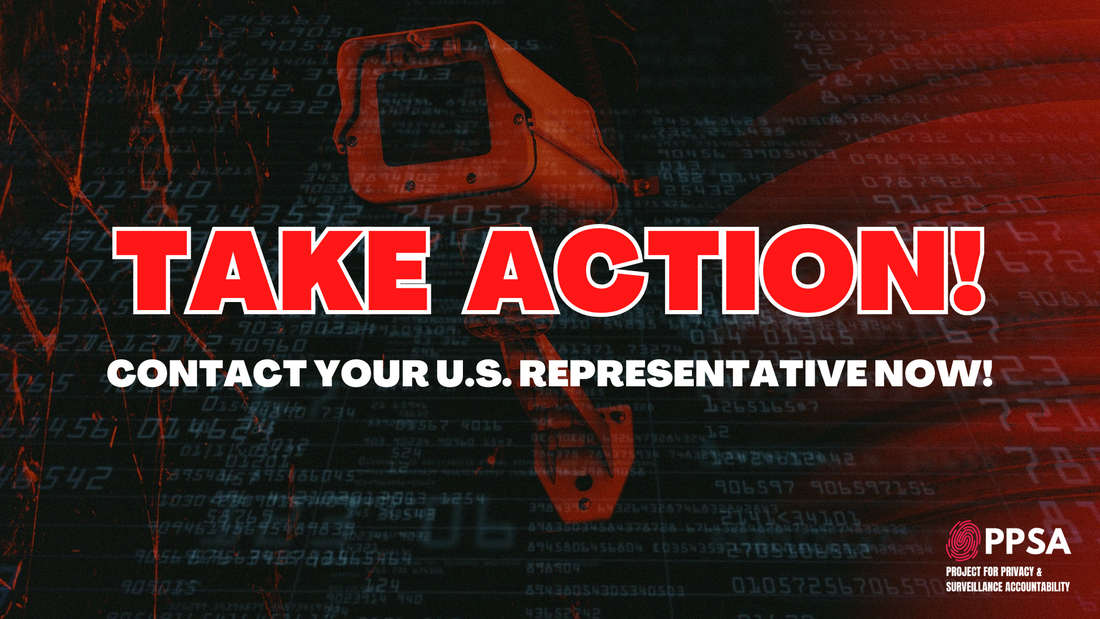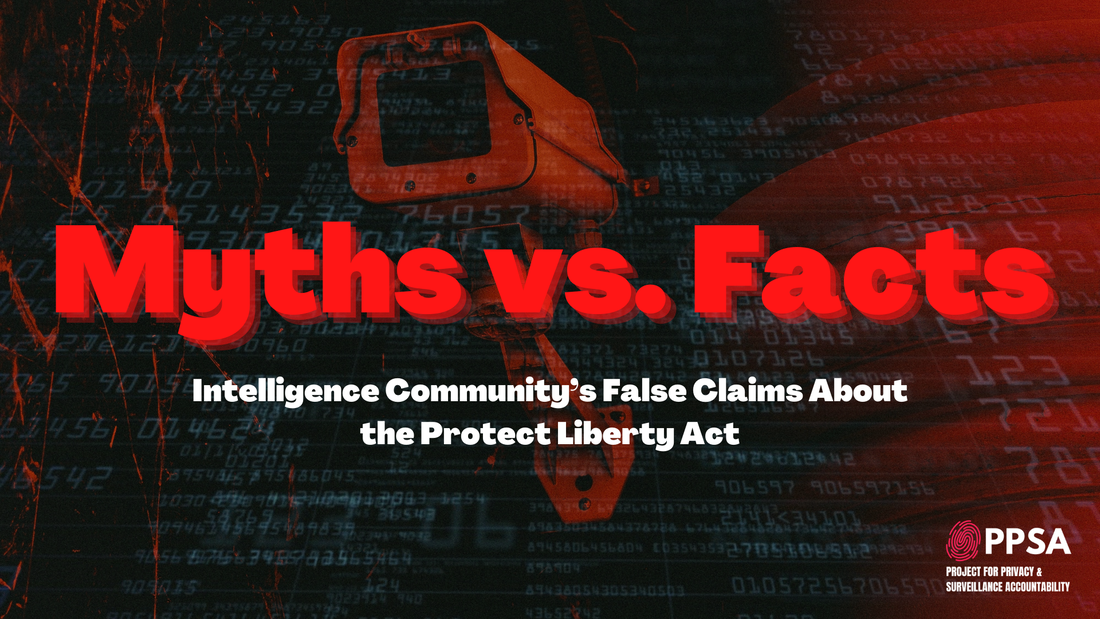|
The word from Capitol Hill is that Speaker Mike Johnson is scheduling a likely House vote on the reauthorization of FISA’s Section 702 this week. We are told that proponents and opponents of surveillance reform will each have an opportunity to vote on amendments to this statute.
It is hard to overstate how important this upcoming vote is for our privacy and the protection of a free society under the law. The outcome may embed warrant requirements in this authority, or it may greatly expand the surveillance powers of the government over the American people. Section 702 enables the U.S. intelligence community to continue to keep a watchful eye on spies, terrorists, and other foreign threats to the American homeland. Every reasonable person wants that, which is why Congress enacted this authority to allow the government to surveil foreign threats in foreign lands. Section 702 authority was never intended to become what it has become: a way to conduct massive domestic surveillance of the American people. Government agencies – with the FBI in the lead – have used this powerful, invasive authority to exploit a backdoor search loophole for millions of warrantless searches of Americans’ data in recent years. In 2021, the secret Foreign Intelligence Surveillance Court revealed that such backdoor searches are used by the FBI to pursue purely domestic crimes. Since then, declassified court opinions and compliance reports reveal that the FBI used Section 702 to examine the data of a House Member, a U.S. Senator, a state judge, journalists, political commentators, 19,000 donors to a political campaign, and to conduct baseless searches of protesters on both the left and the right. NSA agents have used it to investigate prospective and possible romantic partners on dating apps. Any reauthorization of Section 702 must include warrants – with reasonable exceptions for emergency circumstances – before the data of Americans collected under Section 702 or any other search can be queried, as required by the U.S. Constitution. This warrant requirement must include the searching of commercially acquired information, as well as data from Americans’ communications incidentally caught up in the global communications net of Section 702. The FBI, IRS, Department of Homeland Security, the Pentagon, and other agencies routinely buy Americans’ most personal, sensitive information, scraped from our apps and sold to the government by data brokers. This practice is not authorized by any statute, or subject to any judicial review. Including a warrant requirement for commercially acquired information as well as Section 702 data is critical, otherwise the closing of the backdoor search loophole will merely be replaced by the data broker loophole. If the House declines to impose warrants for domestic surveillance, expect many politically targeted groups to have their privacy and constitutional rights compromised. We cannot miss the best chance we’ll have in a generation to protect the Constitution and what remains of Americans’ privacy. Copy and paste the message below and click here to find your U.S. Representative and deliver it: “Please stand up for my privacy and the Fourth Amendment to the U.S. Constitution: Vote to reform FISA’s Section 702 with warrant requirements, both for Section 702 data and for our sensitive, personal information sold to government agencies by data brokers.” Government Agencies Pose as Ad Bidders We’ve long reported on the government’s purchase of Americans’ sensitive and personal information scraped from our apps and sold to federal agencies by third-party data brokers. Closure of this data broker loophole is included in the House Judiciary Committee bill – the Protect Liberty and End Warrantless Surveillance Act – legislation that requires probable cause warrants before the federal government can inspect Americans’ data caught up in foreign intelligence under Section 702 of the Foreign Intelligence Surveillance Act. Of no less importance, the bipartisan Protect Liberty Act also requires warrants for inspection of the huge mass of Americans’ data sold to the government.
Thanks to Ben Lovejoy of the 9 to 5 Mac, we now know of the magnitude of the need for a legislative solution to this privacy vulnerability. Apple’s 2020 move to require app makers to notify you that you’re being tracked on your iPhone has been thoroughly undermined by a workaround through the technology of device fingerprinting. Add to that Patternz, a commercial spyware that extracts personal information from ads and push notifications so it can be sold. Patternz tracks up to 5 billion users a day, utterly defeating phone-makers’ attempts to protect consumer privacy. How does it work? 404 Media demonstrated that Patternz has deals with myriad small ad agencies to extract information from around 600,000 apps. In a now-deleted video, an affiliate of the company boasted that with this capability, it could track consumers’ locations and movements in real time. After this article was posted, Google acted against one such market participant, while Apple promises a response. But given the robustness of these tools, it is hard to believe that new corporate policies will be effective. That is because technology allows government agencies to pose as ad buyers to turn adware into a global tracking tool that federal agencies – and presumably the intelligence services of other governments – can access at will. Patternz can even install malware for more thorough and deeper penetration of customers’ phones and their sensitive information. It is almost as insidious as the zero-day malware Pegasus, transforming phones into 24/7 spy devices. Enter Patrick Eddington, senior fellow of the Cato Institute. He writes: “If you’re a prospective or current gun owner and you use your smartphone to go to OpticsPlanet to look for a new red dot sight, then go to Magpul for rail and sling adapters for the modern sporting rifle you’re thinking of buying, then mosey on over to LWRC to look at their latest gas piston AR-15 offerings, and finally end up at Ammunition Depot to check out their latest sale on 5.56mm NATO standard rounds, unless those retailers expressly offer you the option ‘Do not sell my personal data’ … all of your online browsing and ordering activity could end up being for sale to a federal law enforcement agency. “Or maybe even the National Security Agency.” The government’s commercial acquisition of Americans’ personal information from data sales contains troubling implications for both left and right – from abortion-rights activists concerned about women being tracked to clinics, to conservatives who care about the implications of this practice for the Second Amendment or free religious expression, to Americans of all stripes who don’t want our personal and political activities monitored in minute detail by the government. In January, the NSA admitted that it buys our personal information without a warrant. The investigative work performed by 404 Media and 9 to 5 Mac should give Members of Congress all the more reason to support the Protect Liberty Act. While Congress is locked in spirited debate over the limits of surveillance in America, large technology companies are responding to growing consumer concerns about privacy by reducing government’s warrantless access to data.
For years, police had a free hand in requesting from Google the location histories of groups of people in a given vicinity recorded on Google Maps. Last month, Google altered the Location History feature on Google Maps. For users who enable this feature to track where they’ve been, their location histories will now be saved on their smartphone or other devices, not on Google servers. As a result of this change, Google will be unable to respond to geofenced warrants. “Your location information is personal,” Google announced. “We’re committed to keeping it safe, private and in your control.” This week, Amazon followed Google’s lead by disabling its Request for Access tool, a feature that facilitated requests from law enforcement to ask Ring camera owners to give up video of goings on in the neighborhood. We reported three years ago that Amazon had cooperative agreements with more than 2,000 police and fire departments to solicit Ring videos for neighborhood surveillance from customers. By clicking off Request for Access, Amazon is now closing the channel for law enforcement to ask Ring customers to volunteer footage about their neighbors. PPSA commends Google and Amazon for taking these steps. But they wouldn’t have made these changes if consumers weren’t clamoring for a restoration of the expectation of privacy. These changes are a sure sign that the mounting complaints of civil liberties advocates are moving the needle of public opinion. Corporations are exquisitely attuned to consumer attitudes, and so they are listening and acting. In the wake of Thursday’s revelation that the National Security Agency is buying Americans’ location data, we urge Congress to show similar sensitivity. With polls showing that nearly four out of five Americans support strong surveillance reform, Congress should respond to public opinion by passing The Protect Liberty Act, which imposes a warrant requirement on all personal information purchased by government agencies. Late last year, Sen. Ron Wyden (D-OR) put a hold on the appointment of Lt. Gen. Timothy Haugh to replace outgoing National Security Agency director Gen. Paul Nakasone. Late Thursday, Sen. Wyden’s pressure campaign yielded a stark result – a frank admission from Gen. Nakasone that, as long suspected, the NSA purchases Americans’ sensitive, personal online activities from commercial data brokers.
The NSA admitted it buys netflow data, which records connections between computers and servers. Even without the revelation of messages’ contents, such tracking can be extremely personal. A Stanford University study of telephone metadata showed that a person’s calls and texts can reveal connections to sensitive life issues, from Alcoholics Anonymous to abortion clinics, gun stores, mental and health issues including sexually transmitted disease clinics, and connections to faith organizations. Gen. Nakasone’s letter to Sen. Wyden states that NSA works to minimize the collection of such information. He writes that NSA does not buy location information from phones inside the United States, or purchase the voluminous information collected by our increasingly data-hungry automobiles. It would be a mistake, however, to interpret NSA’s internal restrictions too broadly. While NSA is generally the source for signals intelligence for the other agencies, the FBI, IRS, and the Department of Homeland Security are known to make their own data purchases. In 2020, PPSA reported on the Pentagon purchasing data from Muslim dating and prayer apps. In 2021, Sen. Wyden revealed that the Defense Intelligence Agency was purchasing Americans’ location data from our smartphones without a warrant. How much data, and what kinds of data, are purchased by the FBI is not clear. Sen. Wyden did succeed in a hearing last March in prompting FBI Director Christopher Wray to admit that the FBI had, in some period in the recent past, purchased location data from Americans’ smartphones without a warrant. Despite a U.S. Supreme Court opinion, Carpenter (2018), which held that the U.S. Constitution requires a warrant for the government to compel telecom companies to turn over Americans’ location data, federal agencies maintain that the Carpenter standard does not curb their ability to purchase commercially available digital information. In a press statement, Sen. Wyden hammers home the point that a recent Federal Trade Commission order bans X-Mode Social, a data broker, and its successor company, from selling Americans’ location data to government contractors. Another data broker, InMarket Media, must notify customers before it can sell their precise location data to the government. We now have to ask: was Wednesday’s revelation that the Biden Administration is drafting rules to prevent the sale of Americans’ data to hostile foreign governments an attempt by the administration to partly get ahead of a breaking story? For Americans concerned about privacy, the stakes are high. “Geolocation data can reveal not just where a person lives and whom they spend time with but also, for example, which medical treatments they seek and where they worship,” FTC Chair Lina Khan said in a statement. “The FTC’s action against X-Mode makes clear that businesses do not have free license to market and sell Americans’ sensitive location data. By securing a first-ever ban on the use and sale of sensitive location data, the FTC is continuing its critical work to protect Americans from intrusive data brokers and unchecked corporate surveillance.” As Sen. Wyden’s persistent digging reveals more details about government data purchases, Members of Congress are finding all the more reason to pass the Protect Liberty Act, which enforces the Constitution’s Fourth Amendment warrant requirement when the government inspects Americans’ purchased data. This should also put Members of the Senate and House Intelligence Committees on the spot. They should explain to their colleagues and constituents why they’ve done nothing about government purchases of Americans’ data – and why their bills include exactly nothing to protect Americans’ privacy under the Fourth Amendment. More to come … Well, better late than never. Bloomberg reports that the Biden Administration is preparing new rules to direct the U.S. Attorney General and Department of Homeland Security to restrict data transactions that sells our personal information – and even our DNA – to “countries of concern.”
Consider that much of the U.S. healthcare system relies on Chinese companies to sequence patients’ genomes. Under Chinese law, such companies are required to share their data with the government. The Office of the Director of National Intelligence warns that “Losing your DNA is not like losing a credit card. You can order a new credit card, but you cannot replace your DNA. The loss of your DNA not only affects you, but your relatives and, potentially, generations to come.” The order is also expected to crack down on data broker sales that could facilitate espionage or blackmail of key individuals serving in the federal government; it could be used to panic or distract key personnel in the event of a crisis; and collection of data on politicians, journalists, academics, and activists could deepen the impact of influence campaigns across the country. PPSA welcomes the development of this Biden rule. We note, however, that just like China, our own government routinely purchases Americans’ most sensitive and personal information from data brokers. These two issues – foreign access to commercially acquired data, and the access to this same information by the FBI, IRS, Department of Homeland Security, and other agencies – are related but separate issues that need to be addressed separately, the latter in the legislative process. The administration’s position on data purchases is contradictory. The administration also opposes closing the data-broker loophole in the United States. In the Section 702 debate, Biden officials say we would be at a disadvantage against China and other hostile countries that could still purchase Americans’ data. This new Biden Administration effort undercuts its argument. We should not emulate China’s surveillance practices any more than we practice their crackdowns against freedom of speech, religion, and other liberties. Still, this proposed rule against foreign data purchases is a step in the right direction, in itself and for highlighting the dire need for legislation to restrict the U.S. government’s purchase of its own citizens’ data. The Protect Liberty Act, which passed by the House Judiciary Committee by an overwhelming 35-2 vote to reauthorize Section 702, closes this loophole at home just as the Biden Administration seeks to close it abroad. So when the new Biden rule is promulgated, it should serve as a reminder to Congress that we have a problem with privacy at home as well. No sooner did the Protect Liberty and End Warrantless Surveillance Act pass the House Judiciary Committee with overwhelming bipartisan support than the intelligence community began to circulate what Winston Churchill in 1906 politely called “terminological inexactitudes.”
The Protect Liberty Act is a balanced bill that respects the needs of national security while adding a warrant requirement whenever a federal agency inspects the data or communications of an American, as required by the Fourth Amendment. This did not stop defenders of the intelligence community from claiming late last year that Section 702 reforms would harm the ability of the U.S. government to fight fentanyl. This is remarkable, given that the government hasn’t cited a single instance in which warrantless searches of Americans’ communications proved useful in combating the fentanyl trade. Nothing in the bill would stop surveillance of factories in China or cartels in Mexico. If an American does become a suspect in this trafficking, the government can and should seek a probable cause warrant, as is routinely done in domestic law enforcement cases. No sooner did we bat that one away than we heard about fresh terminological inexactitudes. Here are two of the latest bits of disinformation being circulated on Capitol Hill about the Protect Liberty Act. Intelligence Community Myth: Members of Congress are being told that under the Protect Liberty Act, the FBI would be forced to seek warrants from district court judges, who might or might not have security clearances, in order to perform U.S. person queries. Fact: The Protect Liberty Act allows the FBI to conduct U.S. person queries if it has either a warrant from a regular federal court or a probable cause order from the FISA Court, where judges have high-level security clearances. The FBI will determine which type of court order is appropriate in each case. Intelligence Community Myth: Members are being told that under the Protect Liberty Act, terrorists can insulate themselves from surveillance by including a U.S. person in a conversation or email thread. Fact: Under the Protect Liberty Act, the FBI can collect any and all communications of a foreign target, including their communications with U.S. persons. Nothing in the bill prevents an FBI agent from reviewing U.S. person information the agent encounters in the course of reviewing the foreign target’s communications. In other words, if an FBI agent is reading a foreign target’s emails and comes across an email to or from a U.S. person, the FBI agent does not need a warrant to read that email. The bill’s warrant requirement applies in one circumstance only: when an FBI agent runs a query designed to retrieve a U.S. person’s communications or other Fourth Amendment-protected information. That is as it should be under the U.S. Constitution. As we face the renewed debate over Section 702 – which must be reauthorized in the next few months – expect the parade of untruths to continue. As they do, PPSA will be here to call them out. |
Categories
All
|







 RSS Feed
RSS Feed